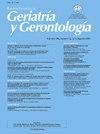Estereotipos negativos hacia la vejez en los estudiantes de trabajo social
Q3 Medicine
引用次数: 0
Abstract
Introduction/objectives
A view free of stereotypes contributes to improve the quality of life and care for the elderly. This study evaluated the degree of negative stereotypes towards old age in social work students and their relation with different variables.
Method
Descriptive cross-sectional study, incidental sample. A total of 124 students participated; they filled in the Questionnaire of Negative Stereotypes towards Old Age (CENVE) and provided data on previous studies, degree of contact with elderly people, fear of old age and death, among others. Application of the Kolmogorov-Smirnov test revealed that the CENVE total score did not follow a normal distribution. Correlational analyses were applied based on Spearman's Rho correlation coefficient. Kruskal-Wallis H-tests and Mann-Whitney U-tests were used for between-group comparisons.
Results
Relation is found among CENVE scores according to course, age, taking Social Work and Aging and age aging starts.
Conclusions
Negative stereotypes towards old age are present in a large part of the sample of students, although with a low intensity. Aging is part of the life cycle and should be done with dignity. During university education, it is crucial that teachers and students become aware of negative stereotypes and attitudes towards old age and question them.
社会工作学生对老年的负面刻板印象
引言/目的摆脱刻板印象的观点有助于提高老年人的生活质量和护理。本研究旨在评估社工学生对老年的负面刻板印象程度及其与不同变量的关系。方法描述性横断面研究,随机抽样。共有124名学生参与;他们填写了对老年的消极刻板印象调查表(CENVE),并提供了关于以前的研究、与老年人接触程度、对老年和死亡的恐惧等方面的数据。应用Kolmogorov-Smirnov检验发现,CENVE总分不服从正态分布。采用Spearman相关系数进行相关分析。组间比较采用Kruskal-Wallis h检验和Mann-Whitney u检验。结果按课程、年龄、选修社会工作和老年化课程的学生CENVE成绩与老年化开始之间存在相关性。结论:对老年的负面刻板印象存在于大部分学生样本中,尽管强度较低。变老是生命周期的一部分,应该有尊严地去做。在大学教育中,至关重要的是,教师和学生要意识到对老年的负面刻板印象和态度,并对它们提出质疑。
本文章由计算机程序翻译,如有差异,请以英文原文为准。
求助全文
约1分钟内获得全文
求助全文
来源期刊

Revista Espanola de Geriatria y Gerontologia
Medicine-Medicine (miscellaneous)
CiteScore
1.90
自引率
0.00%
发文量
62
审稿时长
85 days
期刊介绍:
Una revista de gran prestigio por sus artículos originales de investigación y revisiones. Permite cubrir todas las áreas de la medicina pero siempre desde la atención al paciente anciano, y está presente en los más reconocidos índices internacionales.
 求助内容:
求助内容: 应助结果提醒方式:
应助结果提醒方式:


